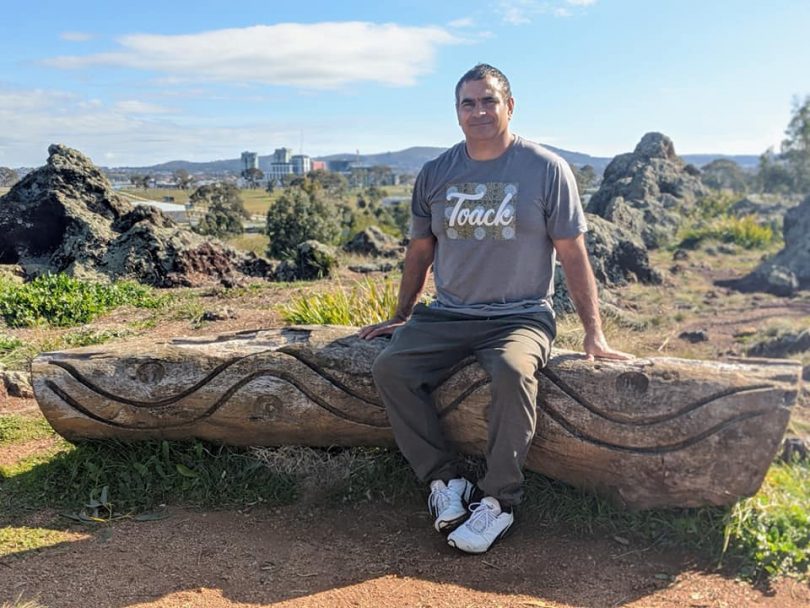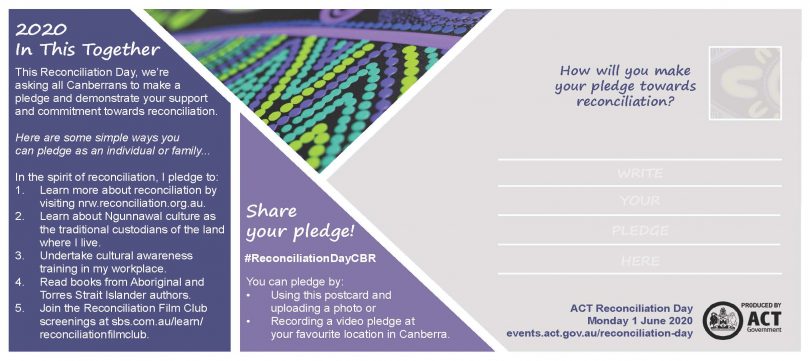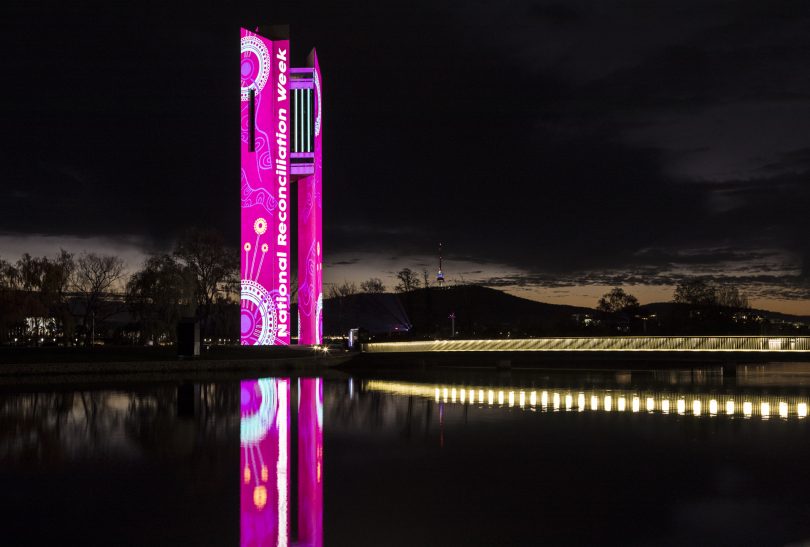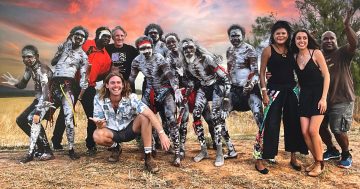
Richie Allan at the Ghubar Dhaara ochre site. Photo: Events ACT.
While the Reconciliation Day events planned for this year can’t go ahead due to COVID-19 restrictions, the message remains the same: this is a time for starting conversations, thinking about Reconciliation and asking about how it applies to you.
As we mark the public holiday for Reconciliation Day (the only Australian jurisdiction to honour reconciliation in this way), there are plenty of ways to do that from home. The call from the ACT’s Reconciliation Council is to get involved, because this is an issue that concerns us all as Australians.
Most Canberra mailboxes have received a Reconciliation Week postcard. The postcards ask Canberrans to make a promise about Reconciliation to yourself, or with family or friends. These could include learning more about the ACT’s traditional owners and about Reconciliation Week, undertaking cultural awareness training and watching films on the topics, or reading Aboriginal and Torres Strait Islander authors.

The Reconciliation Day pledge postcard. Image: Events ACT.
That’s how former Canberra Citizen of the Year and Reconciliation Council member Di Kargas Bray has been spending her weekend. She’s been reading Bruce Pascoe’s award-winning book Dark Emu, which examines evidence from the diaries of early explorers that suggests that pre colonisation Aboriginal cultures had well-established systems of food production and land management, rather than existing wholly as a hunter-gatherer society.
“My thinking is that this is a wonderful opportunity to make a promise to yourself and your family and the process of reconciliation so that we don’t do something on one day and forget about it. Make a promise for every day, every month or just do something once, but properly. Ask a question and seek an answer.
“I’ve told my kids it’s about doing something positive to have the conversation with your family at home, at work or wherever you find yourself”.

Diane Kargas Bray is a member of the ACT Reconciliation Council. Photo: Supplied.
The postcards are intended to be a starting point for reflection, and for recipients to share a photograph or video of your pledges to your social media channels, using the hashtag #ReconciliationDayCBR. The postcards have been delivered to 190,000 Canberra households, hospitals and aged care facilities.
There are some prompts on the ACT’s Reconciliation Week website to start you thinking.
Here are some other examples of how you can get your creative juices flowing: take some photos of items you feel connects you to reconciliation; paint, draw or create sculptures to express what reconciliation means to you; pen a letter, write a poem or short story that describes the way you connect with reconciliation and the theme In This Together;film a short video where you are reading aloud your favourite poem or short story or article that relates to the theme.
Email your creativity to reconciliation.event@act.gov.au for the opportunity to be featured on their website.
There will also be a series of videos workshops on the Events ACT YouTube channel.
These include learning how First Nations people cared for the land and helped it recover and rejuvenate. Ngunnawal Kamilaroi man Richie Allan, who runs the Traditional Owners Aboriginal Corporation, will talk about the Molonglo, Murrumbidgee and Yass Rivers, and the cultural history of the rivers that connected and once flowed through Lake Burley Griffin.
He’ll also discuss artefacts at Gubur Dhaura Ochre Pit (Ngunnawal name for ‘Ochre Ground’) and show how these can be identified in our backyard, the suburbs or bushland.
Indigenous ranger Kristi Lee will take her audience on a journey of discovery through Tidbinbilla Nature Reserve in the second video workshop. She’ll take you to a grass tree site and show you local native plants and animals specific to the area.
Kristi has a Bachelor of Science degree and studied ecology and conservation management at the ANU. She received the ‘Caring for Country’ award at 2019 ACT NAIDOC Awards.
In the third video workshop, Wiradjuri man Adam Shipp, who runs the Yurbay consultancy, and Richie Allan will cook ‘Buru’ (a Ngunnawal word for kangaroo) over hot coals, as well as lemon myrtle damper at the Jerrabomberra Wetlands Culture Garden using local bush herbs.
“I think the significance for us is to be able to showcase these dishes and local traditional plants in the way they were used for thousands of years but also how they can be used today”, Adam says. “Kangaroo is a really good meat with low fat and plenty of protein. In the video, we give tips for how to make this in the kitchen using local herbs as well the more traditional style over the fire”.
“We talk about being kind through the pandemic,” Di Kargas Bray says. “This is about more than that. It’s about being interested and engaged and saying I will do something.”
Genevieve Jacobs is the co-chair of the ACT Reconciliation Council.

Reconciliation projections on the Carillon will run from 6:00 pm to 11:00 pm until Wednesday, 3 June. Photo: Michelle Kroll.













